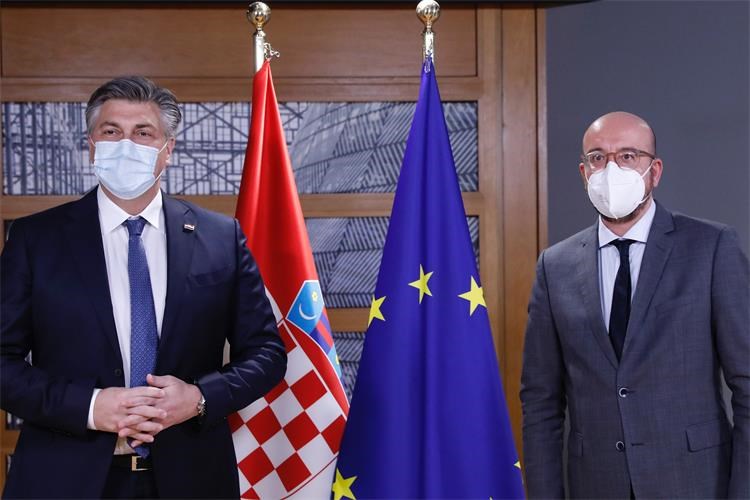


The prime minister said after all meetings that he was "very satisfied with the visit and the meaningful, top-level talks."
He disagreed that Croatia was among the EU countries that were shortchanged in the distribution of COVID-19 vaccines procured by the European Commission for all member states, which is what Austrian Chancellor Sebastian Kurz spoke about earlier today.
Croatia has so far received around 400,000 vaccine doses, and around 300,000 people have been vaccinated, with one or both doses. Some other EU members have so far received more doses in relation to their population size.
Plenković said that this depended on which pharmaceutical company countries ordered the vaccine from. Even though all those companies have problems with the production dynamic, some are faster and some lag behind considerably.
Croatia procured vaccines according to information available at the time on which of them could be approved fastest, Plenković explained.
"The information at the time when we ordered 2.7 million doses from AstraZeneca was that its vaccine was likely to be approved first," Plenković said.
Eventually, AstraZeneca's vaccine was approved third and the company has been the slowest in deliveries in relation to its contractual obligations.
Croatia first ordered 900,000 doses from BioNTech/Pfizer, and then raised the order to 1.2 million and later to 1.9 million doses.
It also ordered one million doses from Moderna and one million from Johnson & Johnson.
Two days ago, BioNTech/Pfizer said that in the next two weeks it would deliver an additional four million doses on top of its contractual obligation, and Plenković said that Croatia, too, would get some of those doses.
As for the procurement of the Russian Sputnik V vaccine, Plenković said that Croatia would buy it once it was approved by the European Medicines Agency.
Second application for post-earthquake aid in 10 days
"The damage has been estimated. Now a technical document is being finalised which the government will endorse next week and then it will be sent to the Commission. After that I expect the Commission to be broadminded and fair towards Croatia in helping us rebuild that part of the country," he said.
Last year Croatia was given €683.7 million from the European Solidarity Fund to deal with the aftermath of a magnitude 5.5 earthquake that struck Zagreb and its environs in March. A magnitude 6.3 tremor hit central Croatia in late December.
In Brussels today, Plenković talked with European Commission Executive Vice-President for Competition Margrethe Vestager, Executive Vice-President for Economy Valdis Dombrovskis and Vice-President for Democracy and Demography Dubravka Šuica.
The talks discussed the Commission's support for the reconstruction of earthquake-hit areas, the adoption of a national recovery and resilience plan, and Croatia's ambition to join the euro and Schengen areas.
Croatia to get highest amount for recovery from COVID crisis
With Vestager, Plenković discussed aid for recovering from the COVID crisis and everything done for the Croatian economy in agreement with the Commission.
With Dombrovskis, he discussed the drafting of the national recovery and resilience plan, a key document for attracting funds from the Recovery and Resilience Facility as part of which Croatia has at its disposal €6 billion in grants and €3.6 billion in loans.
All member states must submit their recovery and resilience plans by the end of April.
Croatia's draft plan covers the economy, the judiciary, public administration and state assets, science, education and research, the social policy and the labour market, healthcare, and energy efficiency and post-earthquake reconstruction.
"We are now in the final stage of consultations and wish, based on the advice of Vice President Dombrovskis, who has a broader view of what all other countries are doing, to make some corrections and enhance our plan so that it is complete in time and approved by the European Commission," said Plenković.
Dombrovskis said that in relation to per capita GDP, Croatia was given the most funding from the Next Generation EU instrument, intended for the recovery of the European economy from the coronavirus crisis, of all EU countries - 13%.
He said that Croatia would enjoy his and the EC's full support for accession to the euro area.
Plenković and EC Vice-President Šuica discussed issues from within her remit such as demography and the Conference on the Future of Europe, which is expected to start officially on Europe Day, May 9.
Plenković on Thursday met with NATO Secretary-General Jens Stoltenberg, Belgian PM Alexander De Croo and European Parliament President David Sassoli.
On Thursday evening he held talks with EC President Ursula von der Leyen and European Council President Charles Michel.
Discussed were Croatia's priorities regarding the drafting of the national recovery and resilience plan, vaccine distribution, the fight against COVID-19, Croatia's ambitions to join the Schengen area of passport-free movement and the euro area, and other topics.
Text: HINA